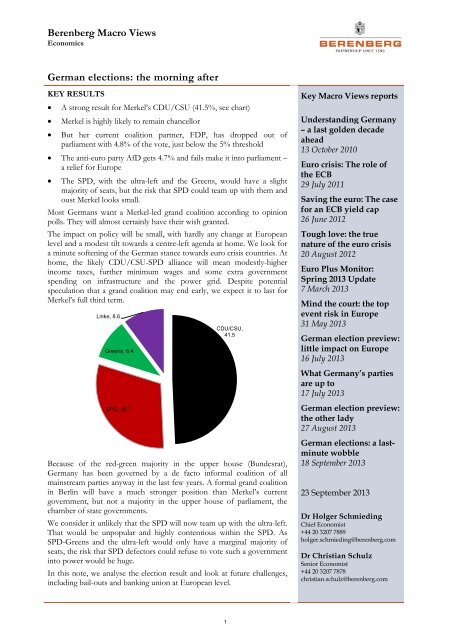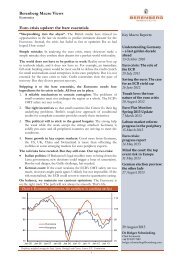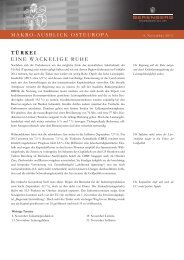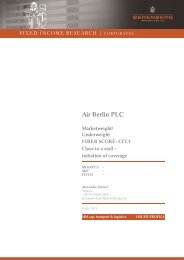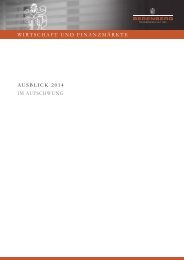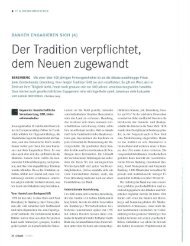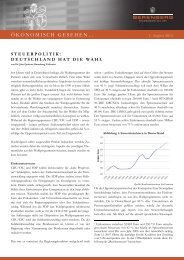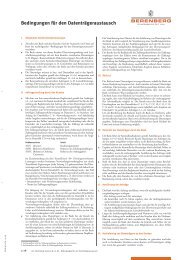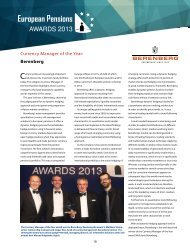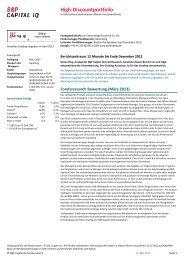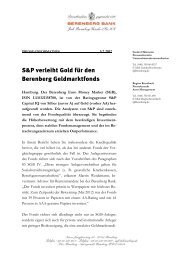Berenberg Macro Views German elections: the ... - Berenberg Bank
Berenberg Macro Views German elections: the ... - Berenberg Bank
Berenberg Macro Views German elections: the ... - Berenberg Bank
You also want an ePaper? Increase the reach of your titles
YUMPU automatically turns print PDFs into web optimized ePapers that Google loves.
<strong>Berenberg</strong> <strong>Macro</strong> <strong>Views</strong><br />
Economics<br />
<strong>German</strong> <strong>elections</strong>: <strong>the</strong> morning after<br />
KEY RESULTS<br />
• A strong result for Merkel’s CDU/CSU (41.5%, see chart)<br />
• Merkel is highly likely to remain chancellor<br />
• But her current coalition partner, FDP, has dropped out of<br />
parliament with 4.8% of <strong>the</strong> vote, just below <strong>the</strong> 5% threshold<br />
• The anti-euro party AfD gets 4.7% and fails make it into parliament –<br />
a relief for Europe<br />
• The SPD, with <strong>the</strong> ultra-left and <strong>the</strong> Greens, would have a slight<br />
majority of seats, but <strong>the</strong> risk that SPD could team up with <strong>the</strong>m and<br />
oust Merkel looks small.<br />
Most <strong>German</strong>s want a Merkel-led grand coalition according to opinion<br />
polls. They will almost certainly have <strong>the</strong>ir wish granted.<br />
The impact on policy will be small, with hardly any change at European<br />
level and a modest tilt towards a centre-left agenda at home. We look for<br />
a minute softening of <strong>the</strong> <strong>German</strong> stance towards euro crisis countries. At<br />
home, <strong>the</strong> likely CDU/CSU-SPD alliance will mean modestly-higher<br />
income taxes, fur<strong>the</strong>r minimum wages and some extra government<br />
spending on infrastructure and <strong>the</strong> power grid. Despite potential<br />
speculation that a grand coalition may end early, we expect it to last for<br />
Merkel’s full third term.<br />
Linke, 8.6<br />
Greens, 8.4<br />
CDU/CSU,<br />
41.5<br />
Key <strong>Macro</strong> <strong>Views</strong> reports<br />
Understanding <strong>German</strong>y<br />
– a last golden decade<br />
ahead<br />
13 October 2010<br />
Euro crisis: The role of<br />
<strong>the</strong> ECB<br />
29 July 2011<br />
Saving <strong>the</strong> euro: The case<br />
for an ECB yield cap<br />
26 June 2012<br />
Tough love: <strong>the</strong> true<br />
nature of <strong>the</strong> euro crisis<br />
20 August 2012<br />
Euro Plus Monitor:<br />
Spring 2013 Update<br />
7 March 2013<br />
Mind <strong>the</strong> court: <strong>the</strong> top<br />
event risk in Europe<br />
31 May 2013<br />
<strong>German</strong> election preview:<br />
little impact on Europe<br />
16 July 2013<br />
What <strong>German</strong>y’s parties<br />
are up to<br />
17 July 2013<br />
SPD, 25.7<br />
Because of <strong>the</strong> red-green majority in <strong>the</strong> upper house (Bundesrat),<br />
<strong>German</strong>y has been governed by a de facto informal coalition of all<br />
mainstream parties anyway in <strong>the</strong> last few years. A formal grand coalition<br />
in Berlin will have a much stronger position than Merkel’s current<br />
government, but not a majority in <strong>the</strong> upper house of parliament, <strong>the</strong><br />
chamber of state governments.<br />
We consider it unlikely that <strong>the</strong> SPD will now team up with <strong>the</strong> ultra-left.<br />
That would be unpopular and highly contentious within <strong>the</strong> SPD. As<br />
SPD-Greens and <strong>the</strong> ultra-left would only have a marginal majority of<br />
seats, <strong>the</strong> risk that SPD defectors could refuse to vote such a government<br />
into power would be huge.<br />
In this note, we analyse <strong>the</strong> election result and look at future challenges,<br />
including bail-outs and banking union at European level.<br />
<strong>German</strong> election preview:<br />
<strong>the</strong> o<strong>the</strong>r lady<br />
27 August 2013<br />
<strong>German</strong> <strong>elections</strong>: a lastminute<br />
wobble<br />
18 September 2013<br />
23 September 2013<br />
Dr Holger Schmieding<br />
Chief Economist<br />
+44 20 3207 7889<br />
holger.schmieding@berenberg.com<br />
Dr Christian Schulz<br />
Senior Economist<br />
+44 20 3207 7878<br />
christian.schulz@berenberg.com<br />
1
<strong>Berenberg</strong> <strong>Macro</strong> <strong>Views</strong><br />
Economics<br />
Grand coalition most likely, no Bundesrat majority<br />
Merkel’s CDU/CSU is <strong>the</strong> great winner of Sunday’s <strong>elections</strong>, gaining 7.7<br />
percentage points compared to 2009, mostly at <strong>the</strong> expense of <strong>the</strong> junior<br />
coalition partner FDP (see Chart 1). The CDU/CSU even came close to an<br />
outright majority, winning 311 of 630 seats, just six short of <strong>the</strong> majority.<br />
The SPD also recovered a little from <strong>the</strong> losses of 2009 and obtained 192<br />
seats. The Greens (63 seats) and Left Party (64 seats) sustained significant<br />
losses, and <strong>the</strong> Pirates proved to be a temporary phenomenon.<br />
Against <strong>the</strong> weak trend for small parties, <strong>the</strong> anti-euro AfD achieved 4.7%<br />
of <strong>the</strong> vote from scratch, but failed to enter <strong>the</strong> Bundestag, which made<br />
some headlines. Relative to <strong>the</strong> strength of maverick parties elsewhere<br />
(UKIP in <strong>the</strong> UK, Front National in France, Wilders in <strong>the</strong> Ne<strong>the</strong>rlands,<br />
Strache/Stronach in Austria), <strong>the</strong> 4.7% for <strong>German</strong> AfD is quite contained<br />
anyway. This shows that <strong>German</strong>y’s pro-euro consensus is pretty solid.<br />
Large parties win, small parties<br />
lose. Exception: AfD<br />
Anti-euro party performs well, but<br />
pro-European consensus stable<br />
NO MAJORITY IN THE UPPER HOUSE<br />
A grand coalition or an unlikely alliance between CDU/CSU and Greens<br />
may have a healthy majority in <strong>the</strong> Bundestag, but in <strong>the</strong> upper house, <strong>the</strong><br />
Bundesrat, where <strong>German</strong>y’s 16 states are represented, nei<strong>the</strong>r would have<br />
a majority. Only <strong>the</strong> possible left alliance of SPD, Greens and Linke have a<br />
majority <strong>the</strong>re. Since <strong>the</strong> Bundesrat is involved in almost all decisions<br />
involving serious money, <strong>the</strong> new government will continue to have to<br />
strike deals with that majority.<br />
In <strong>the</strong> separate state election in Hesse on Sunday, <strong>the</strong> CDU-FDP state<br />
government lost its majority, probably paving <strong>the</strong> way for a grand coalition<br />
at state level. But this remains unclear. As a small consolation to <strong>the</strong> FDP,<br />
<strong>the</strong> liberals made it into <strong>the</strong> Hesse state parliament, with 5.0%. But even if<br />
Hesse turns to a grand coalition as well, this combination would still only<br />
have 29 out of 69 votes in <strong>the</strong> upper house (see Chart 2), and this will not<br />
change soon. The next scheduled state <strong>elections</strong> are:<br />
- Saxony (CDU/FDP, summer 2014)<br />
- Thuringia (CDU/SPD, summer 2014)<br />
- Brandenburg (SPD/Linke), summer 2014)<br />
- Hamburg (SPD/Greens, spring 2015)<br />
- Bremen (SPD/Greens, spring 2015)<br />
This means that, even in a best case scenario whereby grand coalitions are<br />
formed at each of <strong>the</strong>se <strong>elections</strong>, summer 2014 would be <strong>the</strong> earliest point<br />
at which a Grand coalition could obtain a majority in <strong>the</strong> upper house.<br />
However, a grand coalition should find it relatively easy to bring <strong>the</strong> Greens<br />
onside, with which it would rule all but two states (Saxony and<br />
Brandenburg). That is a far more comfortable position than Merkel’s<br />
outgoing coalition enjoyed.<br />
Even grand coalition without<br />
outright majority in Bundesrat<br />
Hesse may turn to grand coalition<br />
as well<br />
No major <strong>elections</strong> in sight<br />
Greens likely to support grand<br />
coalition<br />
2
<strong>Berenberg</strong> <strong>Macro</strong> <strong>Views</strong><br />
Economics<br />
Chart 1: Winners and losers<br />
Chart 2: No majority in <strong>the</strong> upper house?<br />
10<br />
8<br />
6<br />
4<br />
2<br />
0<br />
-2<br />
-4<br />
-6<br />
-8<br />
-10<br />
-12<br />
Rhineland<br />
Palatinate, 4<br />
Lower Saxony,<br />
6<br />
North-Rhine<br />
Westphalia, 6<br />
Bremen, 3<br />
Hamburg, 3<br />
Brandenburg, 4 Saxony, 4<br />
Hesse, 5<br />
Saar, 3<br />
Bavaria, 6<br />
Saxony Anhalt,<br />
4<br />
Thuringia, 4<br />
Changes in voting shares from 2009 <strong>elections</strong>, percentage points. Source:<br />
<strong>German</strong> public television<br />
Schleswig-<br />
Holstein, 4<br />
Baden-<br />
Wuerttemberg,<br />
6<br />
Berlin, 4<br />
Mecklenburg<br />
West<br />
Pomerania, 3<br />
Seats in <strong>the</strong> upper house of parliament (Bundesrat) by coalition. SPD (red), Greens<br />
(green), CDU/CSU (black), FDP (yellow), Linke (violet), 12m sum. Hess before<br />
last night’s <strong>elections</strong>. Source: Bundesrat<br />
3
<strong>Berenberg</strong> <strong>Macro</strong> <strong>Views</strong><br />
Economics<br />
What would a grand coalition do?<br />
Merkel’s CDU/CSU stands for virtually unchanged policies, while <strong>the</strong> SPD<br />
endorses Merkel’s euro policies but wants a partial reversal of <strong>the</strong> 2004<br />
reforms that had turned <strong>German</strong>y into Europe’s growth engine. We expect<br />
<strong>the</strong> two sides to agree on:<br />
- virtually unchanged euro policies<br />
- no euro bonds or o<strong>the</strong>r serious mutualisation of debt<br />
- some discussion over a debt redemption fund, possibly to be relegated<br />
to a committee (which would likely report back that such a fund would<br />
be unconstitutional in <strong>German</strong>y)<br />
- a minor fiscal stimulus through more spending on infrastructure and<br />
<strong>the</strong> power grid<br />
- a modest hike in top marginal income taxes and possibly capital gains<br />
taxes<br />
- more minimum wages for ever more sectors, but not quite a uniform<br />
national minimum wage<br />
- a gradual reduction in subsidies for solar and wind energy.<br />
Slightly more centre-left agenda at<br />
home<br />
Table 1 gives an overview of <strong>the</strong> campaign platforms of <strong>the</strong> major parties;<br />
more can be found in our note What <strong>German</strong>y’s parties are up to of 17 July<br />
2013.<br />
In preparation of coalition talks, which could commence early next week,<br />
<strong>the</strong> SPD will call a party convention at which it will discuss policies and<br />
probably also personnel. Merkel is also likely to have preliminary talks with<br />
<strong>the</strong> Green party, although <strong>the</strong> policy differences, personal animosities and<br />
<strong>the</strong> lack of any majority in <strong>the</strong> upper house of parliament make such an<br />
alliance extremely unlikely. Such talks may prove to be more of a bargaining<br />
chip in Merkel’s negotiations with <strong>the</strong> SPD. Forming a new coalition<br />
government usually takes 1-2 months in <strong>German</strong>y, depending on how<br />
difficult <strong>the</strong> negotiations are and how many coalition variants <strong>the</strong>re are. The<br />
grand coalition in 2005 took two months to form, so it could take a similar<br />
amount of time this year.<br />
Besides <strong>the</strong> actual policies <strong>the</strong> coalition partners will eventually agree,<br />
personnel decisions will be very important. The position of <strong>the</strong> Finance<br />
Minister will grab particular attention in <strong>the</strong> Eurozone, as <strong>the</strong> current<br />
Finance Minister, Schaeuble, a political heavy-weight and respected pro-<br />
European, has played a key role in <strong>the</strong> management of <strong>the</strong> euro crisis so far.<br />
In <strong>the</strong> last grand coalition, Peer Steinbrueck of <strong>the</strong> SPD was finance<br />
minister, but a weakened SPD may not obtain <strong>the</strong> post this time around.<br />
The Bavarian sister party of Merkel’s CDU, <strong>the</strong> CSU, which performed<br />
strongly in both <strong>the</strong> national and <strong>the</strong> regional <strong>elections</strong> last week, may also<br />
claim <strong>the</strong> post.<br />
Policy overview in Table 1<br />
Negotiations to be prepared this<br />
week<br />
Finance minister post up for grabs?<br />
4
<strong>Berenberg</strong> <strong>Macro</strong> <strong>Views</strong><br />
Economics<br />
The challenges: budget, banking union, bail-outs<br />
On <strong>the</strong> domestic front, <strong>the</strong> 2014 federal budget needs to be agreed and<br />
submitted to <strong>the</strong> EU Commission by 15 October, before <strong>the</strong> Bundestag can<br />
pass it by <strong>the</strong> end of <strong>the</strong> year.<br />
It is on <strong>the</strong> European level that <strong>the</strong> new government needs to hit <strong>the</strong><br />
ground running. At <strong>the</strong> Eurozone Finance Minister meeting on 14<br />
October, <strong>the</strong> agreement with <strong>the</strong> European Parliament (EP) on <strong>the</strong> ECB’s<br />
role as banking super visor (Single Supervisory Mechanism, SSM) needs to<br />
be finalised. The much more controversial Directive on bank resolution –<br />
especially <strong>the</strong> questions of <strong>the</strong> legal basis, <strong>the</strong> resolution authority and its<br />
financing – need to be addressed, so that <strong>the</strong> 24 October summit can make<br />
a proposal to <strong>the</strong> EP. The time pressure results from <strong>the</strong> fact that <strong>the</strong> EP<br />
faces <strong>elections</strong> on 22 May 2014. Ideally, <strong>the</strong> parliament could discuss and<br />
pass <strong>the</strong> legislation this year, although that seems extremely ambitious.<br />
Ireland’s bail-out programme expires at <strong>the</strong> end of this year. On 15<br />
January, <strong>the</strong> country has to redeem a government bond of €6.6bn, probably<br />
mostly held by <strong>the</strong> ECB. While that should be possible for Ireland even<br />
without support from <strong>the</strong> Eurozone, extending an enhanced conditionality<br />
credit line (ECCL) of <strong>the</strong> rescue fund ESM to <strong>the</strong> country would help to<br />
smooth <strong>the</strong> transition.<br />
Portugal and Greece are currently going through reviews by <strong>the</strong> troika of<br />
EU, IMF and ECB. Preliminary results may be discussed at <strong>the</strong> 14 October<br />
Eurozone Finance Minister meeting as well, and both may be less flattering<br />
than recently. The junior partner in <strong>the</strong> Portuguese coalition has demanded<br />
an easing of austerity. The Portuguese programme expires in mid 2014, and<br />
<strong>the</strong> decision as to whe<strong>the</strong>r <strong>the</strong> country needs a second full bail-out or just a<br />
flexible credit line is likely to depend on <strong>the</strong> outcome of <strong>the</strong> negotiations.<br />
Greece may be even more complicated. Being on track to achieve a<br />
primary surplus at <strong>the</strong> end of <strong>the</strong> year, <strong>the</strong> country has delivered on <strong>the</strong><br />
conditions set last November to qualify for fur<strong>the</strong>r debt relief. But <strong>the</strong> IMF<br />
is also insisting on relief of up to €11bn to allow Greece to make faster<br />
progress towards hitting <strong>the</strong> debt ratio of 120% by 2020. On top of that, it<br />
is pressuring <strong>the</strong> Eurozone to commit ESM loans of €11bn to fund Greece<br />
through 2015 as well. Some reward for Greece’s efforts is likely to find<br />
support in <strong>German</strong>y’s new political constellation, although any new<br />
government will also keep <strong>the</strong> pressure on Greece to continue <strong>the</strong> reform<br />
process and catch up delays, for example in <strong>the</strong> privatisation process.<br />
The SPD has been sympa<strong>the</strong>tic to <strong>the</strong> Eurozone growth pact proposed by<br />
France last year. More investment to spur growth both in <strong>German</strong>y and <strong>the</strong><br />
Eurozone are likely to be at <strong>the</strong> top of <strong>the</strong>ir agenda. However, even <strong>the</strong><br />
Social Democrats are unlikely to be much more generous when it comes to<br />
funding.<br />
The tough love approach in <strong>the</strong> Eurozone – core Europe plus ECB help,<br />
Euro-periphery accepts <strong>the</strong> conditions attached – has survived changes of<br />
government in all peripheral countries. It will also survive <strong>the</strong> change in <strong>the</strong><br />
composition of government in <strong>German</strong>y. Give or take a few details,<br />
2014 budget first test at home<br />
<strong>Bank</strong>ing union on <strong>the</strong> agenda in 3<br />
weeks already<br />
Ireland could get a credit line to<br />
smooth bail-out exit<br />
Portugal between Irish-style credit<br />
line and second bail-out<br />
Carrot and stick for Greece<br />
A new “growth pact” for Europe?<br />
Tough love remains <strong>the</strong> Eurozone<br />
script<br />
6
<strong>Berenberg</strong> <strong>Macro</strong> <strong>Views</strong><br />
Economics<br />
Disclaimer<br />
This document was compiled by <strong>the</strong> above mentioned authors of <strong>the</strong> economics department of Joh.<br />
<strong>Berenberg</strong>, Gossler & Co. KG (hereinafter referred to as “<strong>the</strong> <strong>Bank</strong>”),. The <strong>Bank</strong> has made any effort to<br />
carefully research and process all information. The information has been obtained from sources which we<br />
believe to be reliable such as, for example, Thomson Reuters, Bloomberg and <strong>the</strong> relevant specialised press.<br />
However, we do not assume liability for <strong>the</strong> correctness and completeness of all information given. The<br />
provided information has not been checked by a third party, especially an independent auditing firm. We<br />
explicitly point to <strong>the</strong> stated date of preparation. The information given can become incorrect due to passage<br />
of time and/or as a result of legal, political, economic or o<strong>the</strong>r changes. We do not assume responsibility to<br />
indicate such changes and/or to publish an updated document. The forecasts contained in this document or<br />
o<strong>the</strong>r statements on rates of return, capital gains or o<strong>the</strong>r accession are <strong>the</strong> personal opinion of <strong>the</strong> author<br />
and we do not assume liability for <strong>the</strong> realisation of <strong>the</strong>se.<br />
This document is only for information purposes. It does not constitute a financial analysis within <strong>the</strong> meaning<br />
of § 34b or § 31 Subs. 2 of <strong>the</strong> <strong>German</strong> Securities Trading Act (Wertpapierhandelsgesetz), no investment<br />
advice or recommendation to buy financial instruments. It does not replace consulting regarding legal, tax or<br />
financial matters.<br />
Remarks regarding foreign investors<br />
The preparation of this document is subject to regulation by <strong>German</strong> law. The distribution of this document<br />
in o<strong>the</strong>r jurisdictions may be restricted by law, and persons, into whose possession this document comes,<br />
should inform <strong>the</strong>mselves about, and observe, any such restrictions.<br />
United Kingdom<br />
This document is meant exclusively for institutional investors and market professionals, but not for private<br />
customers. It is not for distribution to or <strong>the</strong> use of private investors or private customers.<br />
United States of America<br />
This document has been prepared exclusively by Joh. <strong>Berenberg</strong>, Gossler & Co. KG. Although <strong>Berenberg</strong><br />
Capital Markets LLC, an affiliate of <strong>the</strong> <strong>Bank</strong> and registered US broker-dealer, distributes this document to<br />
certain customers, <strong>Berenberg</strong> Capital Markets LLC does not provide input into its contents, nor does this<br />
document constitute research of <strong>Berenberg</strong> Capital Markets LLC. In addition, this document is meant<br />
exclusively for institutional investors and market professionals, but not for private customers. It is not for<br />
distribution to or <strong>the</strong> use of private investors or private customers.<br />
This document is classified as objective for <strong>the</strong> purposes of FINRA rules. Please contact <strong>Berenberg</strong> Capital<br />
Markets LLC (+1 617.292.8200), if you require additional information.<br />
Copyright<br />
The <strong>Bank</strong> reserves all <strong>the</strong> rights in this document. No part of <strong>the</strong> document or its content may be rewritten,<br />
copied, photocopied or duplicated in any form by any means or redistributed without <strong>the</strong> <strong>Bank</strong>’s prior written<br />
consent.<br />
© May 2013 Joh. <strong>Berenberg</strong>, Gossler & Co. KG<br />
8
<strong>Berenberg</strong> <strong>Macro</strong> <strong>Views</strong><br />
Economics<br />
Contacts: Investment <strong>Bank</strong>ing<br />
Equity Research<br />
E-mail: firstname.lastname@berenberg.com; Internet www.berenberg.de<br />
BANKS ECONOMICS MID-CAP GENERAL<br />
Nick Anderson +44 (0) 20 3207 7838 Dr. Holger Schmieding +44 (0) 20 3207 7889 Gunnar Cohrs +44 (0) 20 3207 7894<br />
James Chappell +44 (0) 20 3207 7844 Dr. Christian Schulz +44 (0) 20 3207 7878 Bjoern Lippe +44 (0) 20 3207 7845<br />
Andrew Lowe +44 (0) 20 3465 2743 Robert Wood +44 (0) 20 3207 7822 Anna Patrice +44 (0) 20 3207 7863<br />
Eoin Mullany +44 (0) 20 3207 7854 Stanislaus von Thurn und Taxis +44 (0) 20 3207 2631<br />
Eleni Papoula +44 (0) 20 3465 2741 FOOD MANUFACTURING<br />
Michelle Wilson +44 (0) 20 3465 2663 Fintan Ryan +44 (0) 20 3465 2748<br />
Andrew Steele +44 (0) 20 3207 7926 REAL ESTATE<br />
BEVERAGES James Targett +44 (0) 20 3207 7873 Kai Klose +44 (0) 20 3207 7888<br />
Philip Morrisey +44 (0) 20 3207 7892 Estelle Weingrod +44 (0) 20 3207 7931<br />
Josh Puddle +44 (0) 20 3207 7881 GENERAL RETAIL & LUXURY GOODS<br />
Bassel Choughari +44 (0) 20 3465 2675 TECHNOLOGY<br />
BUSINESS SERVICES John Guy +44 (0) 20 3465 2674 Adnaan Ahmad +44 (0) 20 3207 7851<br />
William Foggon +44 (0) 20 3207 7882 Sebastian Grabert +44 (0) 20 3207 7834<br />
Simon Mezzanotte +44 (0) 20 3207 7917 HEALTHCARE Daud Khan +44 (0) 20 3465 2638<br />
Arash Roshan Zamir +44 (0) 20 3465 2636 Scott Bardo +44 (0) 20 3207 7869 Ali Khwaja +44 (0) 20 3207 7852<br />
Konrad Zomer +44 (0) 20 3207 7920 Alistair Campbell +44 (0) 20 3207 7876 Tammy Qiu +44 (0) 20 3465 2673<br />
Charles Cooper +44 (0) 20 3465 2637<br />
CAPITAL GOODS Louise Hinds +44 (0) 20 3465 2747 TELECOMMUNICATIONS<br />
Frederik Bitter +44 (0) 20 3207 7916 Adrian Howd +44 (0) 20 3207 7874 Wassil El Hebil +44 (0) 20 3207 7862<br />
Benjamin Glaeser +44 (0) 20 3207 7918 Tom Jones +44 (0) 20 3207 7877 Usman Ghazi +44 (0) 20 3207 7824<br />
William Mackie +44 (0) 20 3207 7837 Stuart Gordon +44 (0) 20 3207 7858<br />
Margaret Paxton +44 (0) 20 3207 7934 HOUSEHOLD & PERSONAL CARE Laura Janssens +44 (0) 20 3465 2639<br />
Alexander Virgo +44 (0) 20 3207 7856 Jade Barkett +44 (0) 20 3207 7937 Paul Marsch +44 (0) 20 3207 7857<br />
Felix Wienen +44 (0) 20 3207 7915 Seth Peterson +44 (0) 20 3207 7891 Barry Zeitoune +44 (0) 20 3207 7859<br />
CHEMICALS INSURANCE TOBACCO<br />
Asad Farid +44 (0) 20 3207 7932 Tom Carstairs +44 (0) 20 3207 7823 Erik Bloomquist +44 (0) 20 3207 7870<br />
John Philipp Klein +44 (0) 20 3207 7930 Peter Eliot +44 (0) 20 3207 7880 Kate Kalashnikova +44 (0) 20 3465 2665<br />
Jaideep Pandya +44 (0) 20 3207 7890 Kai Mueller +44 (0) 20 3465 2681<br />
Mat<strong>the</strong>w Preston +44 (0) 20 3207 7913 UTILITIES<br />
CONSTRUCTION Sami Taipalus +44 (0) 20 3207 7866 Robert Chantry +44 (0) 20 3207 7861<br />
Chris Moore +44 (0) 20 3465 2737 Andrew Fisher +44 (0) 20 3207 7937<br />
Robert Muir +44 (0) 20 3207 7860 MEDIA Oliver Salvesen +44 (0) 20 3207 7818<br />
Michael Watts +44 (0) 20 3207 7928 Robert Berg +44 (0) 20 3465 2680 Lawson Steele +44 (0) 20 3207 7887<br />
Emma Coulby +44 (0) 20 3207 7821<br />
DIVERSIFIED FINANCIALS Laura Janssens +44 (0) 20 3465 2639<br />
Pras Jeyanandhan +44 (0) 20 3207 7899 Sarah Simon +44 (0) 20 3207 7830<br />
Sales<br />
Specialist Sales Sales E-mail: firstname.lastname@berenberg.com; Internet www.berenberg.de<br />
BANKS LONDON BENELUX<br />
Iro Papadopoulou +44 (0) 20 3207 7924 John von <strong>Berenberg</strong>-Consbruch +44 (0) 20 3207 7805 Miel Bakker (London) +44 (0) 20 3207 7808<br />
Matt Chawner +44 (0) 20 3207 7847 Susette Mantzel (Hamburg) +49 (0) 40 350 60 694<br />
CONSUMER Toby Flaux +44 (0) 20 3465 2745 Alexander Wace (London) +44 (0) 20 3465 2670<br />
Rupert Trotter +44 (0) 20 3207 7815 Sean Heath +44 (0) 20 3465 2742<br />
David Hogg +44 (0) 20 3465 2628 SCANDINAVIA<br />
INSURANCE Zubin Hubner +44 (0) 20 3207 7885 Ronald Bernette (London) +44 (0) 20 3207 7828<br />
Trevor Moss +44 (0) 20 3207 7893 Ben Hutton +44 (0) 20 3207 7804 Marco Weiss (Hamburg) +49 (0) 40 350 60 719<br />
James Mat<strong>the</strong>ws +44 (0) 20 3207 7807<br />
HEALTHCARE David Mortlock +44 (0) 20 3207 7850<br />
Frazer Hall +44 (0) 20 3207 7875 Peter Nichols +44 (0) 20 3207 7810 Sales Trading<br />
Richard Payman +44 (0) 20 3207 7825 HAMBURG<br />
TECHNOLOGY George Smibert +44 (0) 20 3207 7911 Paul Dontenwill +49 (0) 40 350 60 563<br />
Jean Beaubois +44 (0) 20 3207 7835 Anita Surana +44 (0) 20 3207 7855 Christian Endras +49 (0) 40 350 60 359<br />
Paul Walker +44 (0) 20 3465 2632 Gregor Labahn +49 (0) 40 350 60 571<br />
UTILITIES Chris McKeand +49 (0) 40 350 60 798<br />
Benita Barretto +44 (0) 20 3207 7829 FRANKFURT Fin Schaffer +49 (0) 40 350 60 596<br />
Michael Brauburger +49 (0) 69 91 30 90 741 Lars Schwartau +49 (0) 40 350 60 450<br />
INDUSTRIALS Nina Buechs +49 (0) 69 91 30 90 735 Marvin Schweden +49 (0) 40 350 60 576<br />
Chris Armstrong +44 (0) 20 3207 7809 André Grosskurth +49 (0) 69 91 30 90 734 Tim Storm +49 (0) 40 350 60 415<br />
Kaj Alftan +44 (0) 20 3207 7879 Boris Koegel +49 (0) 69 91 30 90 740 Philipp Wiechmann +49 (0) 40 350 60 346<br />
Joerg Wenzel +49 (0) 69 91 30 90 743<br />
CRM<br />
LONDON<br />
LONDON PARIS Stewart Cook +44 (0) 20 3465 2752<br />
Greg Swallow +44 (0) 20 3207 7833 Christophe Choquart +33 (0) 1 5844 9508 Simon Messman +44 (0) 20 3465 2754<br />
Laura Cooper +44 (0) 20 3207 7806 Dalila Farigoule +33 (0) 1 5844 9510 Stephen O'Donohoe +44 (0) 20 3465 2753<br />
Clémence La Clavière-Peyraud +33 (0) 1 5844 9521<br />
CORPORATE ACCESS Olivier Thibert +33 (0) 1 5844 9512 PARIS<br />
LONDON Sylvain Granjoux +33 (0) 1 5844 9509<br />
Patricia Nehring +44 (0) 20 3207 7811 ZURICH<br />
Stephan Hofer +41 (0) 44 283 2029<br />
EVENTS Carsten Kinder +41 (0) 44 283 2024 Sovereign Wealth Funds<br />
LONDON Gianni Lavigna +41 (0) 44 283 2038 LONDON<br />
Natalie Meech +44 (0) 20 3207 7831 Benjamin Stillfried +41 (0) 44 283 2033 Max von Doetinchem +44 (0) 20 3207 7826<br />
Charlotte Kilby +44 (0) 20 3207 7832<br />
Charlotte Reeves +44 (0) 20 3465 2671<br />
Hannah Whitehead +44 (0) 20 3207 7922<br />
US Sales<br />
E-mail: firstname.lastname@berenberg-us.com<br />
BERENBERG CAPITAL MARKETS LLC<br />
Member FINRA & SIPC Andrew Holder +1 (617) 292 8222 Kelleigh Faldi +1 (617) 292 8288<br />
Colin Andrade +1 (617) 292 8230 Kieran O'Sullivan +1 (617) 292 8292<br />
Cathal Carroll +1 (646) 445 7206 Emily Mouret +1 (646) 445 7204<br />
Burr Clark +1 (617) 292 8282 Jonathan Saxon +1 (646) 445 7202<br />
Julie Doherty +1 (617) 292 8228<br />
9


